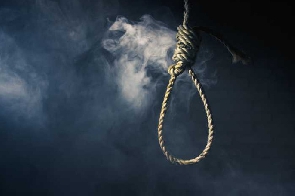Opinions of Saturday, 7 October 2023
Columnist: Daniel Adama
Suicide - The silent killer of our youth
As the weekend approached, I found myself deeply contemplating the promise I made to share a reflection with you. However, what I discovered in a research article titled “Suicide in Ghana: How Could the Community-Based Health Planning and Service (CHPS) Effectively Contribute to Its Prevention?” by Assan A, Aikins M, Takian A. (2019) shook me to my core.
The statistics revealed were profoundly disturbing – approximately 1,500 suicide cases are reported annually in Ghana, with each reported case concealing four unreported ones, summing up to nearly 6,000 unreported cases each year. What's even more disheartening is that a significant portion (78%) of these tragic cases involves individuals aged 15 to 29, and the majority occur within low- and middle-income countries.
While I was still grappling with the weight of this revelation, I stumbled upon news articles on Ghanaweb that chronicled the heartbreaking stories of a primary school teacher who took his own life after being falsely accused of being gay and a UCC level 300 female student who similarly succumbed to despair.
In fact, GhanaWeb has kept a full dossier of suicide news in Ghana and a quick read of some of the news articles dampened my spirit. Find the dossier here: https://www.ghanaweb.com/GhanaHomePage/NewsArchive/dossier.php?ID=608
This deeply troubling surge in suicide cases among Ghana's youth is a clear indication of a crisis that demands immediate attention and resolute action from our authorities. It is a crisis that transcends mere numbers; it reflects the overwhelming societal pressures that bear down on our citizens, particularly our young people.
This growing menace has laid bare a critical need for comprehensive mental health support and a concerted effort to dismantle the stigma that shrouds mental health issues.
For far too long, Ghana, like many other nations, clung to antiquated laws that not only criminalized suicide attempts but also failed to provide the compassion and support needed by those facing mental health challenges.
Survivors of suicide attempts were subjected to prosecution, perpetuating the pervasive stigma and fear surrounding mental health issues. Thankfully, our parliament recognized the need for change and commendably abolished these outdated laws.
On March 29, 2023, the Parliament of Ghana passed the Criminal Offences (Amendment) Bill 2021, decriminalizing suicides through a Private Member’s Bill sponsored by Hon. Kwame Anyimadu-Antwi and others. While this represents a significant milestone, it is merely one component of a broader, more complex solution required to address the root causes of this crisis.
To effectively tackle this multifaceted issue, we must establish comprehensive support systems for individuals grappling with suicidal thoughts. As a nation, we must invest substantially inaccessible mental health services that encompass counseling and therapy.
These services should be readily accessible in both urban and rural areas to ensure a wider reach. Additionally, if feasible, these services should be incorporated into the National Health Insurance Scheme to make it easy for all and sundry to access.
We must also launch extensive public awareness campaigns to destigmatize mental health issues. These campaigns should foster open, honest conversations about mental health and emphasize the importance of seeking help proactively.
We need to provide support to NGOs in the mental health space to widen their efforts. We could also use the Information Services Department, Information Centers scattered across the country, and Radio Stations to reach out to the citizens to educate them about mental health.
We might also consider using content creators to create content around mental health, as many young people are increasingly engaged with social media platforms.
We need to also recognize the unique challenges faced by our young population, and develop tailored programs that offer mentorship, counseling, and life skills training. Empowering our youth is a fundamental step toward prevention.
Traditional authorities play a vital role in our communities. They should reconsider their laws which require survivors to pacify their gods and pay fines in the event of a failed suicide attempt. Rather, they should encourage their people to embrace these survivors and offer them the necessary support to overcome these suicidal tendencies.
By fostering a society that values and cares for the well-being of all its citizens, we can collectively work toward a future where the tragedy of suicide becomes a rare occurrence rather than a growing epidemic.
The suicide crisis in Ghana is an urgent matter that demands immediate and sustained action. I take this opportunity to appeal to our authorities to prioritize mental health support, awareness, and intervention. The time to act is now, and together, we can save lives and build a brighter, more hopeful future for our beloved nation. I implore you to rise to this occasion, for the well-being of our citizens and the future of our nation are at stake.













